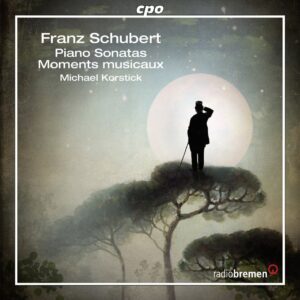Michael Korstick’s Schubert interpretations evoke granite structures coated with steel, as if Rudolf Serkin’s brain were welded to Alexis Weissenberg’s hands. A tone that tends to become harsh and monochrome in loud moments compounds his generally stern outlook, while the colors resulting from this pianist’s huge dynamic range are of the fluorescent variety, as opposed to oils, pastels, or watercolors. If you respond to Alfred Brendel’s Schubert, then Korstick’s Schubert is akin to Brendel on steroids.
The pounding insistence of the D. 959 A major exposition’s downbeats and development section’s double notes sends a red flag, while the unrelentingly loud torrent of notes in the Andantino’s central climax conveys brutality rather than anguish. The Scherzo is steady but a mite overphrased, in contrast to the more discreet inflections we hear from Andsnes and Perahia. While the Allegretto Rondo is appreciably direct, Korstick’s heavy accentuation wears thin; he doesn’t come close to Pollini’s songful sensitivity.
Although Korstick’s extensive booklet notes cogently address interpretive issues and attempt to make a case for taking the sixth of the Moments musicaux at a tempo far slower than what “Allegretto” represents, citing the revelatory effect of hearing Sviatoslav Richter’s slow-motion traversal, Richter’s hypnotic legato, feeling for long lines, and carefully scaled dynamics rivet your attention for 12 minutes, while Korstick’s 14-minute crawl lacks comparable sustaining power and dynamic judgment: he often gets too loud too soon. By contrast, Korstick’s leisurely readings of Nos. 1 and 2 convincingly mirror Richter’s austere paradigm.
While No. 3 is meticulously voiced, the little tempo modifications sound contrived, as if Korstick had “rehearsed the spontaneity”. No. 4’s thoughtfully phrased contrapuntal outer sections bookend a central trio pretentiously hoisted upon a monumental petard. Yet he seizes No. 5’s Allegro Vivace tempo like a lion grabbing his first piece of raw meat in days. Weighing in at 25 minutes with exposition repeat intact, Korstick’s conception of the B-flat sonata’s long first movement is microscopically detailed and grimly monolithic; I leave it to other listeners to decide whether he generates momentum or tedium. This mindset permeates the Andante Sostenuto, where Korstick’s freeze-framed intensity rivals Richter’s warmer shade of bleakness. By contrast, Korstick rises to the Scherzo’s supple Delicatezza specifications, and accents some of the Trio’s syncopated bass notes with an affectionate kick in the butt. If you can accept the ugly fortissimos and hammered-out dotted rhythms, Korstick’s finale pursues a steady and assiduously galvanic trajectory that underlines the last three words of Schubert’s Allegro ma non troppo directive in red ink.
Happily, Korstick does not try to make the “little” A major D. 664 sonata into something it’s not, and turns in his most limpid and graceful performance on these two discs. Yes, it’s on the serious side, and some collectors will prefer more lyrically shaded and affectionate performances. But if you consider Richter’s similar versions, or the “Unfinished” Symphony conducted by Giulini or Klemperer, Korstick might win you over, just as long as you skip his turgid, charmless Hungarian Melody. Like him or not, Korstick knows how he wants his Schubert to go, and makes it happen, letting the critical chips fall where they may.
































